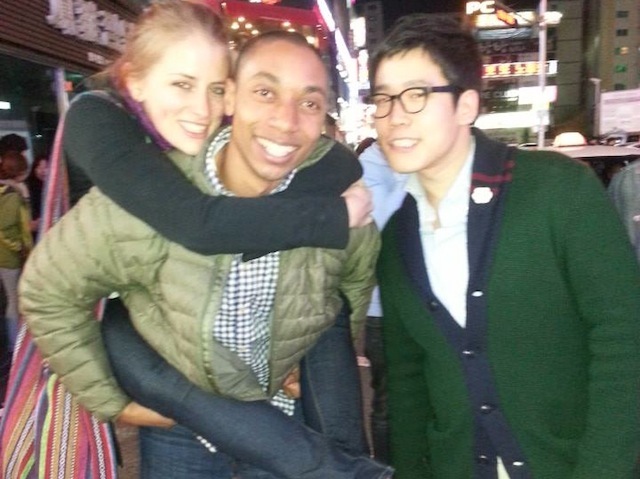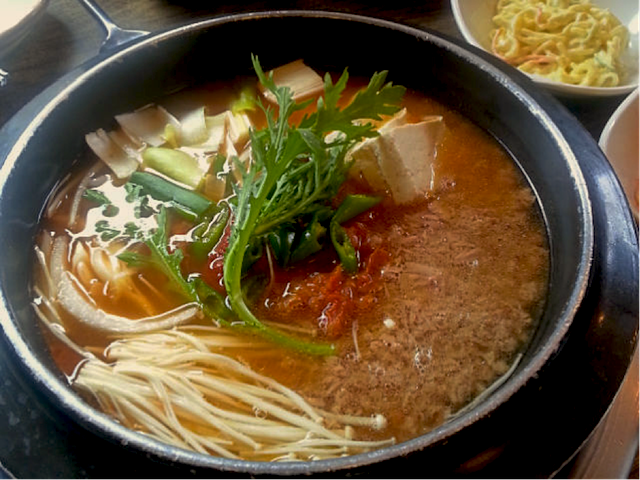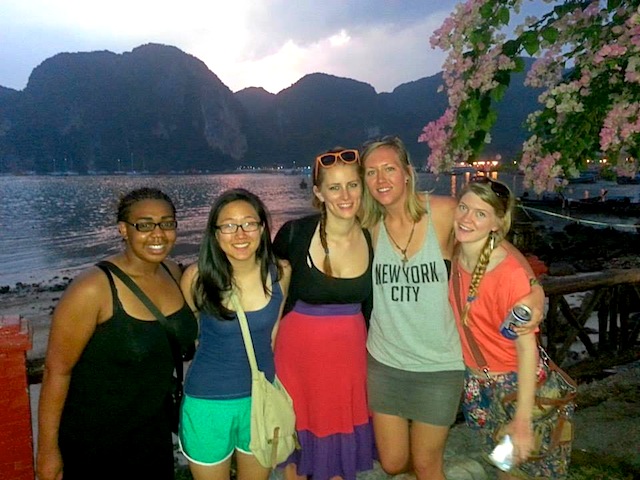 On this edition of Runaway Rendezvous, I got the chance to speak with Morgan of Denver, Colorado. Like most 22 year olds fresh out of college, she’s got an enslaving amount of debt. But she’s also got big dreams of running away and traveling the world. She craves perception altering experiences, wants to devour delicious delicacies, and has made it her goal visit every continent before she’s 25.
On this edition of Runaway Rendezvous, I got the chance to speak with Morgan of Denver, Colorado. Like most 22 year olds fresh out of college, she’s got an enslaving amount of debt. But she’s also got big dreams of running away and traveling the world. She craves perception altering experiences, wants to devour delicious delicacies, and has made it her goal visit every continent before she’s 25.
Morgan took her first step last year by deciding to teach English Abroad. And today she’s teaching full time at school in Korea. Not only is she able to discover and immerse herself in a new way of life but she’s getting paid for it as well. So much so that she’s even been able to pay off some of her debts while simultaneously saving for her next trip.
So if you’re interested in teaching English abroad and have been contemplating Korea, definitely check out what Morgan has to say.
1) Why did you choose Korea?
I graduated in May of 2013 and my two main goals post-college were to pay down my students loans ASAP, and travel as far and wide as possible. Teaching in Korea has allowed me to do both. I plan on travelling extensively, and visiting as many countries as I can, so I was not very particular about where my journey started. As far as teaching abroad goes, Korea has one of the best incentive packages – a free apartment, flight reimbursement, medical insurance that is 50% covered, various bonuses, and on top of all that a wholly decent salary for an entry level job.
2) Did you need any kind of certification?
In the public sector (the EPIK program), which is where I work, you do need a certification. Though it was not always this way, the program is downsizing and as a result they are looking for people who are more qualified, or at the very least more committed. You do not need an actual teaching certificate, but the program does require you to have a TEFL certificate. This being said, obtaining a TEFL certificate is comparatively very easy. My TEFL course was 120 hours long and took about 6 weeks to complete online.
3) What’s an average day like living and working in Korea?
I work 40 hours a week from 8:30-4:30, but what I do on any given day varies significantly. While school is session, I teach anywhere from two to six classes a day. When school is not in session, because I work for a public school my contract requires that I am still in the building. So, some days during breaks and holidays I do what we call “deskwarming,” which is essentially sitting at my desk all day doing my own thing. Though this time bothers some people and can be tedious, I usually enjoy it. I can read, write, work on my blog, or get prepared for the coming weeks. It means I never have to take my work home, and can pursue my own interests in the meantime.
4) What do you love about Korea?
Without question, my first thought is to say that I love the food. Meals are always well balanced, delicious, and generally pretty spicy. I am relatively health conscious and downright addicted to spicy food – so the situation works well for me. My second thought is the feeling of safety I have had since I moved here. Though there is a nominal amount of crime; overall, Korea is an extremely safe country. I feel completely comfortable walking home alone at night, which is not something I would say about walking alone at night in the U.S.
5) What drives you nuts about Korea?
Right now it is summertime here, so at the moment the extreme humidity is driving me a bit crazy. I am from Colorado, and thus am used to a very dry climate. Korea is gets very hot, and very humid. Stepping outside is like stepping into a hot swimming pool that you just can’t escape. I still haven’t adjusted to always feeling sticky and gross, like I constantly need to take a shower.
Another thing that sometimes gets to me is many Korean people’s attitude towards foreigners. Though I wouldn’t say it drives me nuts, it does take a while to get used to. Korea has experienced exponential economic growth in the past 50 years, and prior to this time it was not exactly what you would call an international destination. As such, Korea is an extremely homogenous country. I work in a relatively large city, but for those teachers who work in the countryside, many of them are the only foreigner in their entire town. Even within a city, people will often stare openly, point you out to their friends, and sometimes even ask to take a picture with you (or just take a picture of you). My friends and I are in a ridiculous number of photos with random Korean people who came up and asked to take a picture with us, solely on account of the fact that we are clearly foreigners. Like I said, this isn’t something that drives me nuts, but it is definitely something to consider. If you are really uncomfortable with standing out and being noticed this might not be the country for you.
6) Does your salary allow you to live comfortably and save money?
Absolutely! As I said earlier, one of the main reasons I came to Korea is the very enticing incentive package that comes with the job. How much money you save is really up to you… Some people manage to save upwards of $10,000 U.S. in a year; however, in order to do that you must be very, very conscious of your spending – this means no eating out, and no weekend trips or international vacations. So, though I have not saved 10k in a year, I have paid off a sizeable chunk of my student loans, taken three international trips, been able to pay all my bills, and have still accumulated savings in the 4 digits.
7) What advice would you give to someone interested in teaching English in Korea?
Be very open-minded and go in with as few expectations as possible. Whether or not you enjoy your time in Korea is very much up to you. I won’t lie – there are some significant cultural differences, and these can at times be trying. Additionally, every teacher’s school situation is different. Most people don’t know what school (or even what grade level) they will be teaching until they arrive in their city. Some schools are rich, some are poor, some co-teachers are fluent in English, and others can hardly read the alphabet. Some schools will only use you for ten minutes each lesson, while others will expect you to plan and run entire class periods by yourself. That is why I say to limit your expectations upon entering the program, it’s a very mixed bag and you don’t want to start your year feeling disappointed because something did not turn out the way you expected. I will say this again, because it’s very important – how much you enjoy your time in Korea is hugely dependant on your attitude. Keep an open mind and remember that different is not wrong, it’s just different.
Also, learn Korean! Study it as much as possible before you come, and keep at it once you’re here. Ask your co-teachers for help, take classes, study online, find a language exchange – Just do it. It will make your life a lot easier, and you will be able to get more from the experience if you can communicate effectively with Korean locals.
For more info on teaching English, check out this Runaway Guide “How To Teach English Abroad.”
Learn More About Morgan – ABeautifulView.com
Hello! My name is Morgan Sullivan. Born and raised in Denver, Colorado, I lived there for 22 years before moving to South Korea to teach English. I have suburban sensibilities, penthouse dreams, and am currently pursuing my lifelong dream of international travel. I am always looking to meet new, interesting people, devour delicious foods, and partake in unique experiences – my current goal is to make it to all seven continents by the time I’m 25. Find me on my website A Beautiful View, on Facebook, or tweet to me at @abeautifulview0.














Leave a Reply